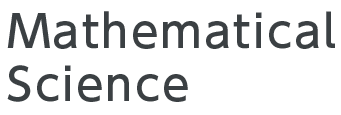Message
Welcome to the Mathematical Modelling website.
As a high school student, you may have come to this page while thinking about what and how you want to study at university. Here we would like to tell you about what we do and about the mathematical approaches to various phenomena.
The “Mathematics” and “Sciences” we study today are fields that began in Western Europe in the 17th century (these fields are collectively called “Modern Western Science”). Every cultural sphere throughout the world had conducted studies that dealt with nature in the past, but these cultures used ordinary, everyday languages such as Japanese, English, French, and German (in fact Latin). On the other hand, 17th century Western Europe gave birth to the idea of using mathematics instead of these vernacular languages to talk about nature (Christian thinking served as the background for Galileo). This concept uses a special approach called the mathematical approach, described below, to deal with natural phenomena.
(1) Create a model of a phenomenon (“mathematical model”) using mathematics as a language,(2) Study the properties of the model using modern mathematics, and(3) Compare reality with the results that have been obtained through experiments and/or observations.
 By switching the language of discussion from vernacular languages to mathematics, we, in only about 400 years, are now able to use electricity, travel to the moon by rocket, and instantly learn about events around the world via the Internet. For example, one mathematical approach to flying a rocket might be as follows. (1) First, create a mathematical model of the rocket’s motion. According to mechanics, a field of physics, this model is given by Newton's second law, which is mathematically a differential equation (although “physics” high school courses under the school-teaching guidance of the Ministry of Education, Culture, Sports, Science and Technology in Japan, rarely discuss motion equations described in the form of differential equations). (2) Since the model is a differential equation, we can examine its properties by using differential equation theory, a branch of (modern) mathematics. (3) The findings obtained here can be applied to the rocket’s motion, thereby allowing us to control and improve the rocket.
By switching the language of discussion from vernacular languages to mathematics, we, in only about 400 years, are now able to use electricity, travel to the moon by rocket, and instantly learn about events around the world via the Internet. For example, one mathematical approach to flying a rocket might be as follows. (1) First, create a mathematical model of the rocket’s motion. According to mechanics, a field of physics, this model is given by Newton's second law, which is mathematically a differential equation (although “physics” high school courses under the school-teaching guidance of the Ministry of Education, Culture, Sports, Science and Technology in Japan, rarely discuss motion equations described in the form of differential equations). (2) Since the model is a differential equation, we can examine its properties by using differential equation theory, a branch of (modern) mathematics. (3) The findings obtained here can be applied to the rocket’s motion, thereby allowing us to control and improve the rocket.
In this way, theoretical physics, mathematics, and experimental physics (or engineering) work together to solve the motion of rockets.
In the above example that dealt with the motion of a rocket, we used a combination of mathematics and physics. Similarly, other combinations such as mathematics and chemistry, as well as mathematics and economics, have been applied to great success as mathematical approaches to various phenomena.
In Japan, although students study mathematics, physics, chemistry, and other subjects through high school in accordance with the teaching guidelines stipulated by the Ministry of Education, Culture, Sports, Science and Technology, they almost never learn about the relationships among these subjects. But in the real world, as mentioned above, these seemingly disparate subjects work together to solve various problems.
In this course, students conduct research and receive education on mathematical models that combine mathematics with other sciences to represent various phenomena. Through this research approach using a mathematical eye, we have discovered, for example, that seemingly completely different phenomena are actually fundamentally the same. Your studies at university will be significantly different from your studies through high school in that university will provide you with cross-disciplinary knowledge.
Q&A for the course
We generally recommend this course for students who enjoy mathematics. The course is also appropriate for those who want to study how mathematics is used in various fields like physics and biology.
Whether or not you are good at mathematics in high school does not matter. If you like mathematics, or even if you just enjoy thinking, you may certainly take this course.
We also feel it might be right for you if you are interested in economics or natural phenomena.
You should focus your studies on the subjects required by the mathematical science course. In particular, you will engage in presentations of a textbook when join a seminar during your third year. As part of the seminar, you must be able to apply the concept of “limits,” so you should focus on studying calculus at university. And you should also become familiar with functional analysis and the Fourier transform.






